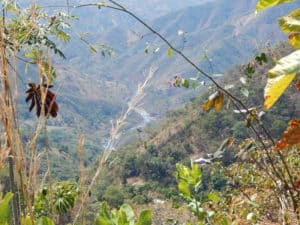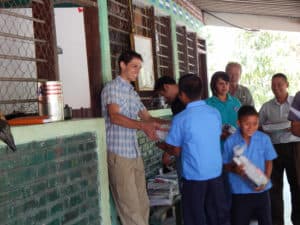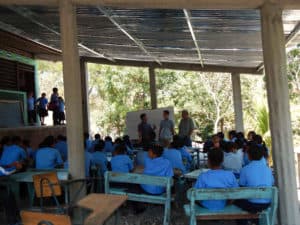March24,2015
Coming to Honduras for the first time, many things might make you feel uneasy because they are different from the environment your body and brain are accustomed to. But the consciousness of that, just what is different and why it makes you uneasy, lags behind the feeling itself. There are biological reasons for that, but suffice it to say it takes a little time for you to figure out what’s different here. One thing you’ll figure out rather quickly, however, especially if you’re over 30 years old, is that there is a superabundance of young people. Anywhere you go in public, they just seem to swarm about you. It’s pretty easy for your conscious brain to figure that out. The median age of the population here is 20.7 years and the life expectancy 74. In the US, the median age is 36.9 and the life expectancy 79.8. That’s a huge difference. Public and social life is dramatically different here because of it.
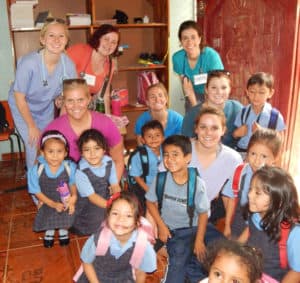
Life for adolescents and young adults is much more structured in the US than here. In the US, almost everyone is in school until at least 18 years of age, and a significant proportion continue with higher education. In Honduras, 60% have finished their education by the sixth grade, much fewer attend or graduate high school, and in realty almost no one goes on to higher education. In the US, young people who are not in school are generally in the work force. In Honduras, those who are in the work force are generally pretty young, but work itself is pretty scarce. Besides these two most obvious and striking differences for the socialization and personal development of youth, the countless supports for adolescents and young adults in the US are rare to non-existent here. Here, families and culture are the principle, if not the only, supports for adolescent development. Some families provide this support superbly. But many families are simply too challenged. Mothers are too young, fathers are too distant or not present at all, financial hardships are too demanding, and older siblings take on parenting roles too young. There are already too many young people, their numbers expand exponentially, and all the while the structures and supports to be a healthy, happy young person are shrinking.
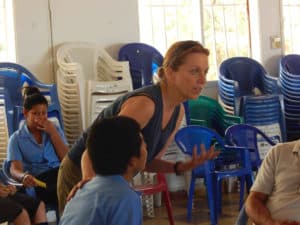
Dr. Martha Kubik and the student nursing brigade from the University of Minnesota have been in Southern Intibucá this past week. Their focus, a much needed focus, is adolescent youth. Laura and I met up with them in Camasca at the High School. We were with them in the auditorium where they were seeing fifteen to twenty year olds. Dr. Kubik was very busy organizing the event, but she had a few minutes to speak with me. With a beaming smile she said to me, “Look at these kids, aren’t they wonderful. They’re just like kids in the US.” I have to admit her statement initially threw me. The difference in experience for kids in Honduras and kids in the US is stark. Honduran kids face challenges that, quite frankly in my opinion, no kid should face. But, I had the opportunity to observe the kids gathered in the auditorium and reflect on what she said. First I recognized that what she said was absolutely correct. Second, I realized that she fully appreciates the challenges for Honduran youth and was responding to them justly and with compassion.
There is a universal experience to what it means to be an adolescent. There is a biological component and its consequent expression in socialization. I watched how the kids touched one another, testing and experimenting. I watched their vivid, almost exaggerated, expressions; moved deeply it seems by life’s fullness and its affect on them. They smile widely at one another, but alone, unwatched, deep sadness can cast shadows over that brilliance. Boys tease girls almost ceaselessly. Girls feign annoyance, glaring at them disapprovingly, then turn to their girl friends with knowing pride. They are insatiably curious. All of them questioned the cards they were given by brigade members. Two simple English words, “vitals” and “screening,” were written on the cards indicating the two procedures they were to have. All of them wanted to know what the words meant. The brave ones called me or one of the interpreters over to translate. A very industrious, young man left the auditorium and returned with an English-Spanish dictionary. Unfortunately, it didn’t help. Challenge and discovery, fear and joy, love and rejection intensely fill their days. The world, their futures, are yet unexplored; terrifying demands and limitless opportunities. Whereas if I studied them carefully I could note the subtle cultural and environmental influences on their behavior, this would dishonor the primary influence of their journey. They are discovering who they are and how to be one with another.
 Dr. Kubik and the University of Minnesota, after extensive research and focus groups here in Honduras, have designed an interviewing tool to use among adolescent, Honduran youth. First they are weighed, measured for height, and have their blood pressure checked. Then they sit down individually, one on one, to dialogue over a few key themes of how to be a young person. Two of the brigade members were Spanish-speaking, and three were assisted by translators. The interview speaks to nutrition, exercise, sports, socialization, relaxation, and a variety of youth health themes. It also touches upon mental health, sexuality, and drug use. The content is excellent. There is no demand that the young person converse. Some might. Most don’t. But they know that many of the things they’ve been feeling are not a mystery. It’s the normal process of life and socialization. If something is discovered in the process that gives concern for the well-being or the health of the young person, a referral is made.
Dr. Kubik and the University of Minnesota, after extensive research and focus groups here in Honduras, have designed an interviewing tool to use among adolescent, Honduran youth. First they are weighed, measured for height, and have their blood pressure checked. Then they sit down individually, one on one, to dialogue over a few key themes of how to be a young person. Two of the brigade members were Spanish-speaking, and three were assisted by translators. The interview speaks to nutrition, exercise, sports, socialization, relaxation, and a variety of youth health themes. It also touches upon mental health, sexuality, and drug use. The content is excellent. There is no demand that the young person converse. Some might. Most don’t. But they know that many of the things they’ve been feeling are not a mystery. It’s the normal process of life and socialization. If something is discovered in the process that gives concern for the well-being or the health of the young person, a referral is made.
When the interviews were over, I watched the brigade members coming back together with the group. They all displayed a satisfied, even joyful, expression. I asked each of them how it went. They all thought it was meaningful. They all seemed to gain a sense of fulfillment. I imagined that for many of these kids this might be the only time someone has explained some of what they are feeling. How essentially important that is! When we honor someone else’s experience, when we can reflect our common humanity, we are sharing a precious gift. Though there is so much more the kids in Honduras need, without this gift of honoring, we would simply miss the real point of it all.
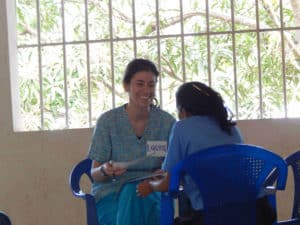 Thank you Dr. Kubik and all of the Minnesota nursing students for honoring the youth of Honduras.
Thank you Dr. Kubik and all of the Minnesota nursing students for honoring the youth of Honduras.
Getting There
March 9, 2015
It’s hard to imagine which is more mysterious and challenging, the terrain or the persons who inhabit it.
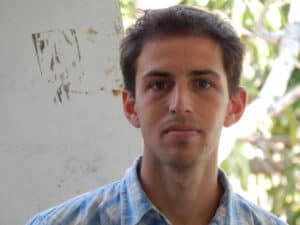
Joshua Back, a fourth year medical student at University of Rochester, has taken nine months off from purely academic pursuits to live and volunteer among the people of San José, San Marcos, Intibucá, Honduras. The university, collaborating with Shoulder to Shoulder for almost a decade of brigade work in San José and the surrounding communities, has invested in relationships of empowerment and development. Josh is deepening and broadening those relationships and discerning the best future practices for the university in its global health outreach in this small corner of Honduras. He met us a few weeks ago at the small bus stop called El Rancho, about a half hour walk from his house, to give us an interview and a tour.
From the highway, everything slopes down at a 45 to 70 degree grade to the river, perhaps two miles. Across the river is a mirror image, climbing at the same steep degree to the most isolated communities in the area. Twenty minutes after meeting us, we’re at Josh’s house, the brigade quarters across the street from the university’s clinic. The walk was an easy one, all downhill. The dirt road is well maintained by Honduras standards, possibly because no one here owns a car to drive on it. An occasional delivery vehicle dares the steep grade. Later in the day we’ll see newly placed telephone poles. The Honduran government drove them here and dropped them on the shoulder of the road. The locals carried them to where they needed to go, dug out the holes, and secured them in the ground. All without any equipment! At his house, Josh informs us we will be walking down the mountain to the community of Portillon. With the aid of the Central American bank, the local school has added seventh and eighth grade, and next year, ninth. There, Josh and the teachers will present the seventh and eighth grade students with donated supplies from the First Unitarian Church in Rochester. Josh asks us how much water we have. When we tell him we have a bottle to share between us, Josh packs three additional bottles and we head out his door. What have we gotten ourselves into?
Half the time we walk along the road, and the other half along mountain paths. The road is longer, zigzagging sharply to lessen the severity of the slope. The paths drop precipitously, the footing is precarious, but the views are awesome. It’s easy going down, save for the tightening of calf muscles, but there is the nagging realization that for every step down there will be a corresponding step up. We meet persons along the road and path, walking or in their homes. Josh stops to speak with them all and to introduce us. His Spanish is a little halting, but he clearly makes himself understood. The Spanish of those living here, however, is heavily accented and harshly abbreviated. With very little formal education and even less contact with the larger world, the locals cannot understand that what they are speaking only roughly approximates Spanish. But Josh’s ear and his whole person has become attuned to the people. He listens intently. Sometimes he still doesn’t understand, and he asks them to repeat. This might take three or four times. Admitting that you don’t understand, highlighting yourself as an outsider, is to place yourself in a very vulnerable position. It’s uncomfortable, unsettling, and creates a sense of insecurity. It’s usually simply easier to pretend that you understand. But the patience and integrity that Josh demonstrates is what draws him into a relationship of trust with the people. It is clear as we walk with him that Josh is well known and well respected among these people.
Josh is a medical student, soon to be a doctor. The empiricist in him must certainly understand the axiom “the shortest distance between two points is a straight line.” But there aren’t many straight lines here. A straight line down or up the mountain would most certainly result in either a mortal accident or a coronary. A straight line to the people would create fear and mistrust. It is often the circuitous route that yields a quality result. That is not an empirical principle, but more properly the understanding of a social scientist. Josh did not present so much as a doctor, but rather a social worker.
Then we arrived at the school in El Portillon. The people here are poor, but the little they have, they have achieved by taking long and arduous journeys. They now have a seventh and eighth grade. Prior to now, if a family wanted a child to be educated beyond the sixth grade, they would have to send the child to either Concepción or San Marcos. Because of the long travel, because of the crooked lines, the child could not commute in the same day and would have to board. That expense prohibited further education for almost everyone. The community found a way. The community has always lacked running water. But as we are visiting, the construction of the holding tank is being completed. The water will be piped from two kilometers away, a spring the community managed to purchase. The community found a way. Josh seems to recognize the tenacity and industriousness of the people as he participates in the ceremony, distributing school supplies. They are just a few small items, a few notebooks, pens, pencils, markers, erasers, and a small calculator. But the gesture demands a grand celebration, another leg of the journey complete.
Then we need to head back. The directions we travel are so varied and complex. To go down means to go up. To go right means to go left. And to look out over the great expanse of mountains and sky, to be overwhelmed by the awesome beauty of nature, means to stand at the edge of a cliff. We arrive at Josh’s house. Josh, much younger and in better shape, is accustomed to the climbs, while we are exhausted. We rest a while before we’ll return to the highway. Josh offers to accompany us, but just as we are preparing to leave, a man stops into visit. He’s difficult to understand and Josh is asking him to repeat. There seems to be something on his mind, something he needs to discuss, but the conversation is anything but direct. Patience, Josh, this looks like it will be another long journey along very winding routes. We take our leave, certain that the University of Rochester will get an excellent report on their mission in Honduras from their social worker, I mean, medical student, Josh Back.
It’s hard to imagine which is more mysterious and challenging, the terrain or the persons who inhabit it.
Transcendence
February 27, 2015
Dr. Hans Rausch was our family physician until I was seven or eight and he retired. I have a lousy memory for things of my childhood, but I well remember this man. He was short and chubby, wore oddly tailored and color clashing clothing, and sported a mustache that today I would recognize as ethnic. He spoke with a pronounced, German accent and had difficulty with English syntax and expressions. He’d tease me with a St. Nick chuckle, and he always called my mother ‘Mama.’ He had those old Highlight children’s magazines in his waiting room. I loved to go and see him. I suppose I remember him so well because he was so foreign. I didn’t know any other Germans when I was six, and I don’t remember any of my later doctors. The foreign, particularly to a six-year old, can be threatening. But rather than a memory of fear and regret, his gentle, kind character yields a soft, welcoming recall, and I’m involuntarily smiling as I write this.
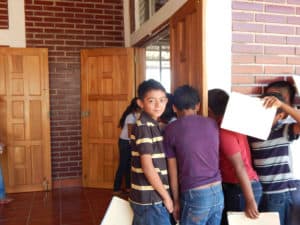
Brown University with Wingate University came down on a brigade last week to the small village of Guachipilincito. I never had patience enough to learn phonetics and I imagine most reading this didn’t either. Roughly, it’s pronounced “watch (light on the ‘t’ sound) + the letter ‘e’ + pea + lean + sea + toe.” When I think of foreign, I think of Guachipilincito. Though it’s only two or three miles from Concepción, it’s an hour and a half on foot and an hour by a four wheel drive vehicle. Birds can get there in a matter of minutes, but any creature limited to ground travel is subject to a challenging quest. It’s not a place to visit. Unless you live there, you don’t go there. Those who do live there, stay there, unless they need to stock up on supplies. The Guachipilincito people are poor, isolated, independent, and “of their own.” For persons from the US, there’s the foreignness of Honduras coupled with the foreignness of Guachipilincito.
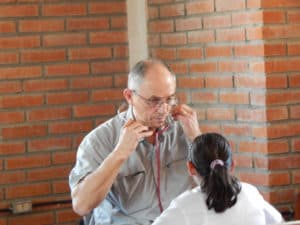
Laura and I visited Guachipilincito and the brigade last Tuesday. (You can read about how we almost didn’t make it there at https://manshipblog.wordpress.com/. But please finish this blog first.) We were surprised by what we found. It didn’t feel foreign at all. In fact, the overwhelming sense was one of familiarity. The doctors and the pharmacists were seeing children from the fourth, fifth and sixth grade. The children stood in line, not anxious or fearful, but joyful. Like all kids do, they fooled with one another, but no one was out of control or acting up. They waited in line with patience as if they had all done this a thousand times before. As they moved up close to their turn to enter the examining room, their smiles widened, not from insecurity, but rather with a joyful expectation. We peered into the examining room and spotted Dr. Emily. She was testing a little girl’s motor skills by raising her arms and asking the child to mirror her movement. Dr. Emily wears a brilliant smile, the movements are graceful and uninhibited, and though we can only see the girl’s back, it’s clear the game is thoroughly enjoyable. The scene is tribute to the beautiful ease of human connection.
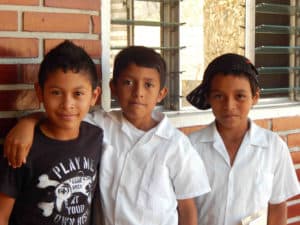
Dr. Emily, Dr. Wayne, and Dr. Tamika are all veterans on this brigade. They clearly like being in Guachipilincito. Robert, the pharmacology professor, and Kelly, the Wingate PharmD student are new to Guachipilincito. But even they are absorbed into this air of familiarity as they fill prescriptions for the children. All of them are in a place where everything is different, and yet they seem to be so at home. To the children of Guachipilincito, the brigade members cannot be anything other than foreign. To Dr. Emily, her husband Jim, Dr. Wayne, Dr. Tamika, Robert, and Kelly, the people of Guachipilincito cannot be anything other than foreign. But this is not what seems to matter. 
I wonder about this little girl who mirrors Dr. Emily raising and stretching her arms. Maybe she’ll live out her days in this small, secluded village of Guachipilincito. Maybe she’ll move out beyond the confines of such isolation and poverty. In either case, she will remember Dr. Emily. The sincerity of human kindness has taught her a priceless lesson. Language, customs, and culture are not the things that separate, limit or determine us. When employed with a willing and believing heart, they liberate us.


